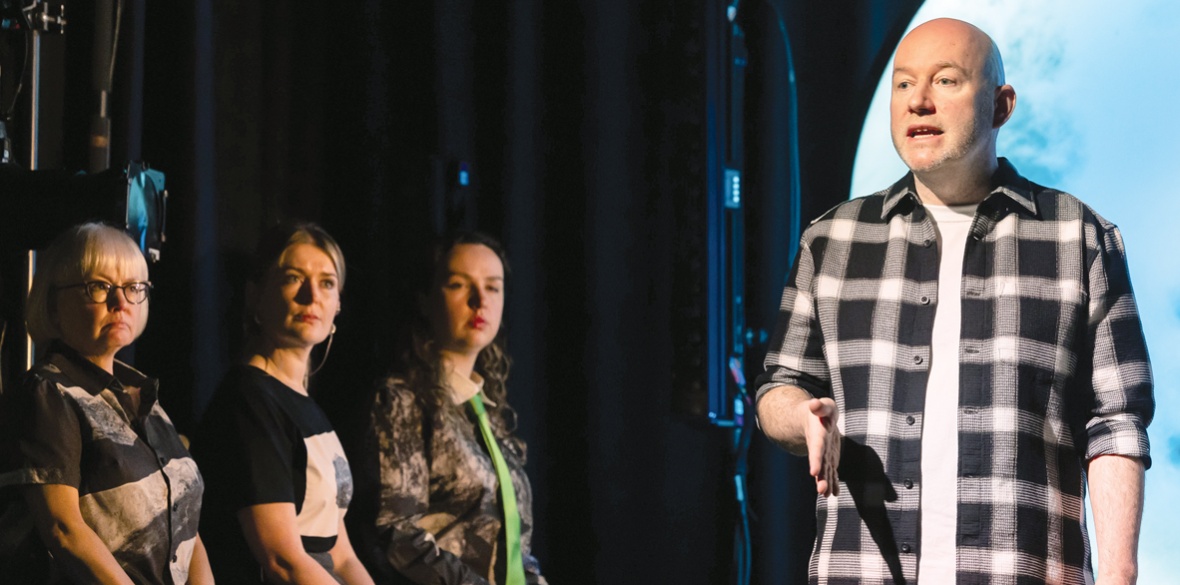This is the last article you can read this month
You can read more article this month
You can read more articles this month
Sorry your limit is up for this month
Reset on:
Please help support the Morning Star by subscribing here
Through the Shortbread Tin
National Theatre of Scotland
A BRILLIANT new play written and performed by the Scottish poet Martin O’Connor probes his early years with his Gaelic-speaking grandfather through his later reading of James MacPherson’s translated epic poem by a 3rd century mythic Scottish bard called Ossian (1760), denounced as a literary “hoax” and ”fake” by Dr Samuel Johnson.
It is “a very thick book,” Martin confides, giving his Edinburgh audience last week a knowing look, about a hundred or so, whom he asks outright how many have heard of Ossian – 15-20 hands – and how many of James MacPherson – perhaps 10 hands.
Having broken the theatre’s fourth wall, Brecht-like, Martin keeps talking to us and asking questions he mostly answers himself onstage without a break for the next 90 minutes, laced with personal reflections about his distant relationship with his Gaelic-speaking grandfather in a West of Scotland working class voice, sometimes repeating the end of phrases, as such voices sometimes do.
This “bored” one reviewer among the many others who have applauded the play — its writer and main(only) narrator, the poet Martin O’Connor, named Scots Performer of the Year in 2024; its Gaelic female trio who sing poems taken from Ossian while walking through an ever changing landscape; its director Lu Kemp (formerly of Perth Theatre); its hard-working BSL interpreter Catherine King, as solid seeming as the huge stone which often revolved centre-stage to become a TV screen shifting the landscape again in front of a huge painted thistle, a giant shortbread finger, an enormous Stag-at-Bay.
Multiple “Visions of Scotland” assault the audience’s eyes/senses from Brig o’ Doon to Kailyard, from the Classic to the Romantic, from High to Low Culture, from History from Above to Multiple “Visions of Scotland” assault the audience’s eyes and senses, from ruling-class to working-class history, from art to folk poetry and song. This play suggests them while questioning them and from the perspective of a young Scot, including several who were being “signed” in the audience by Catherine King’s flashing fingers.
In his adulthood, O’Connor says, he learned Gaelic to better understand his grandfather and thus came across Ossian/MacPherson.
He later warns the audience on the basis of his own “experience” that stories vary depending on who is telling them, indicating that some of what he has said tonight may not be entirely true — “fake” — because “all cultures are hoaxes.”
I suggest rather that all cultures are “forged” – just as “makar” in Scots means poet or “maker” – so all history and culture is “manufactured,” “remade” or “reinvented” through class and culture wars as Marxist scholars have long insisted.
O’Connor’s achievement is to speak directly in his own west of Scotland working-class voice which, like the history and culture of this voice and his grandfather’s speech, is rooted in “history from below” — “people’s history” — meaning it is laced in the three components Raymond Williams said all history and culture always comprise — the residual (past); the dominant (mainstream); and the emergent (new) — all in continual struggle.
This play performs that struggle artistically, personifies it, and the absorption of the audience throughout its 90 unbroken minutes is testament to that.
On tour until May 2. https://www.nationaltheatrescotland.com/events/through-the-shortbread-tin
For those seeking also the significant historic/cultural importance of James MacPherson’s Ossian look no further than Robert Crawford’s Scotland’s Books (Penguin, 2007).







